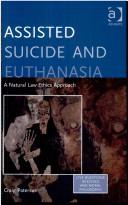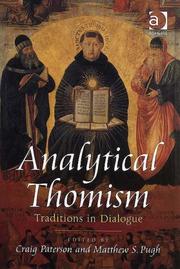| Listing 1 - 9 of 9 |
Sort by
|

ISBN: 9780754657460 9780754657453 Year: 2008 Publisher: Aldershot Ashgate
Abstract | Keywords | Export | Availability | Bookmark
 Loading...
Loading...Choose an application
- Reference Manager
- EndNote
- RefWorks (Direct export to RefWorks)
As medical technology advances and severely injured or ill people can be kept alive and functioning long beyond what was previously medically possible, the debate surrounding the ethics of end-of-life care and quality-of-life issues has grown more urgent.In this lucid and vigorous new book, Craig Paterson discusses assisted suicide and euthanasia from a fully fledged but non-dogmatic secular natural law perspective. He rehabilitates and revitalises the natural law approach to moral reasoning by developing a pluralistic account of just why we are required by practical rationality to respect and not violate key demands generated by the primary goods of persons, especially human life.Important issues that shape the moral quality of an action are explained and analysed: intention/foresight; action/omission; action/consequences; killing/letting die; innocence/non-innocence; and, person/non-person. Paterson defends the central normative proposition that 'it is always a serious moral wrong to intentionally kill an innocent human person, whether self or another, notwithstanding any further appeal to consequences or motive'. Discusses assisted suicide and euthanasia from a secular natural law perspective. This book explains issues that shape the moral quality of an action: intention/foresight; action/omission; action/consequences; killing/letting die; innocence/non-innocence; and, person/non-person.
Natural law --- Medical law --- Professional ethics. Deontology --- hulp bij zelfdoding --- levenseinde (einde van het leven, levenseindebeslissing) --- euthanasie (hulp bij zelfdoding) --- moraalfilosofie --- ethiek (ethische aspecten) --- levenskwaliteit --- pijn (lijden, pijnbestrijding) --- assistance au suicide (aide au suicide) --- fin de vie (décision de fin de vie) --- euthanasie (suicide assistée) --- philosophie morale --- ethique (aspects ethiques) --- qualité de vie (années de vie ajustées sur la qualité) --- douleur (souffrance, lutte contre la douleur) --- Assisted suicide --- Euthanasia --- Law of nature (Law) --- Natural rights --- Nature, Law of (Law) --- Rights, Natural --- Law --- Moral and ethical aspects

ISBN: 1351575082 1315096765 1351575074 1281332755 9786611332754 0754692957 9780754692959 6611332758 9780754657453 0754657450 9780754657460 0754657469 9781315096766 Year: 2008 Publisher: Aldershot, England Burlington, VT Ashgate
Abstract | Keywords | Export | Availability | Bookmark
 Loading...
Loading...Choose an application
- Reference Manager
- EndNote
- RefWorks (Direct export to RefWorks)
"As medical technology advances and severely injured or ill people can be kept alive and functioning long beyond what was previously medically possible, the debate surrounding the ethics of end-of-life care and quality-of-life issues has grown more urgent. In this lucid and vigorous new book, Craig Paterson discusses assisted suicide and euthanasia from a fully fledged but non-dogmatic secular natural law perspective. He rehabilitates and revitalises the natural law approach to moral reasoning by developing a pluralistic account of just why we are required by practical rationality to respect and not violate key demands generated by the primary goods of persons, especially human life. Important issues that shape the moral quality of an action are explained and analysed: intention/foresight; action/omission; action/consequences; killing/letting die; innocence/non-innocence; and, person/non-person. Paterson defends the central normative proposition that 'it is always a serious moral wrong to intentionally kill an innocent human person, whether self or another, notwithstanding any further appeal to consequences or motive'."--Provided by publisher.
Assisted suicide --- Euthanasia --- Natural law. --- Law of nature (Law) --- Natural rights --- Nature, Law of (Law) --- Rights, Natural --- Law --- Moral and ethical aspects. --- Medical ethics
Book
ISBN: 1452868395 9781452868394 Year: 2010 Publisher: Los Angeles : Viewforth Press,
Abstract | Keywords | Export | Availability | Bookmark
 Loading...
Loading...Choose an application
- Reference Manager
- EndNote
- RefWorks (Direct export to RefWorks)
Book
ISBN: 1003081010 1003081010 1000577473 1000577481 0367532298 0367532301 Year: 2022 Publisher: London, England ; New York, New York : Routledge,
Abstract | Keywords | Export | Availability | Bookmark
 Loading...
Loading...Choose an application
- Reference Manager
- EndNote
- RefWorks (Direct export to RefWorks)
"This book offers an applied approach to criminology suitable for prospective police officers. It covers the fundamentals of criminological knowledge, theory and research, and their relevance to policing. The book is split into two parts, the first introducing the basics of criminology, and the second connecting criminological research to police practice. It focuses on the principles of evidence-based practice and encourages students to think critically about the issues covered. Core content includes: A history of policing in England and Wales, through a criminological lens. An overview of the literature on police culture, bias and discretion. A review of the challenges of applying criminological insights to policing, and the impact of the College of Policing code of ethics on police practice. An exploration of the challenges of contemporary policing, including complex crime, transnational investigation, digital and organized crime. A critical overview of evidence, and public sources of evidence. An examination of the contested definitions and perspectives on Evidence-Based Policing. An introduction to criminological research, including quantitative, qualitative and mixed methods. A review of problem solving in policing, including SARA and Atlas models. This book is essential reading for all students studying degrees in Professional Policing, as well as students of criminology engaged in criminal justice knowledge and practice"--
Book
ISBN: 9780857254139 Year: 2011 Publisher: Exeter Learning Matters
Abstract | Keywords | Export | Availability | Bookmark
 Loading...
Loading...Choose an application
- Reference Manager
- EndNote
- RefWorks (Direct export to RefWorks)
Book
ISBN: 9781138499539 1138499536 Year: 2017 Publisher: London Routledge, Taylor & Francis Group
Abstract | Keywords | Export | Availability | Bookmark
 Loading...
Loading...Choose an application
- Reference Manager
- EndNote
- RefWorks (Direct export to RefWorks)
Community policing --- Restorative justice --- Crime prevention

ISBN: 0754634388 9780754634386 9781315262604 9781351958530 Year: 2006 Publisher: Aldershot Ashgate
Abstract | Keywords | Export | Availability | Bookmark
 Loading...
Loading...Choose an application
- Reference Manager
- EndNote
- RefWorks (Direct export to RefWorks)
Analysis (Philosophy) --- Thomas, --- Analysis, Linguistic (Philosophy) --- Analysis, Logical --- Analysis, Philosophical --- Analytic philosophy --- Analytical philosophy --- Linguistic analysis (Philosophy) --- Logical analysis --- Philosophical analysis --- Philosophy, Analytical --- Language and languages --- Methodology --- Philosophy --- Logical positivism --- Semantics (Philosophy) --- Akʻvineli, Tʻoma, --- Akvinietis, Tomas, --- Akvinskiĭ, Foma, --- Aquinas, --- Aquinas, Thomas, --- Foma, --- Thomas Aquinas, --- Tʻoma, --- Toma, --- Tomas, --- Tomasu, --- Tomasu, Akwinasu, --- Tomasz, --- Tommaso, --- Tʻovma, --- Тома, Аквінський, --- תומאס, --- תומס, --- اكويني ، توما --- Ākvīnās, Tūmās, --- اكويني، توما, --- آکويناس، توماس, --- Thomas, - Aquinas, Saint, - 1225?-1274.
Book
ISBN: 1991201052 1991201044 9781991201058 9781991201041 Year: 2021 Publisher: [South Africa]
Abstract | Keywords | Export | Availability | Bookmark
 Loading...
Loading...Choose an application
- Reference Manager
- EndNote
- RefWorks (Direct export to RefWorks)
In order to understand the relationship between social innovation and the reimagining of the knowledge economy necessary to reorient higher education most fully towards the public good, we must draw from the experiences of those working on the front lines.
Book
ISBN: 0409857769 Year: 1981 Publisher: Toronto : Butterworths,
Abstract | Keywords | Export | Availability | Bookmark
 Loading...
Loading...Choose an application
- Reference Manager
- EndNote
- RefWorks (Direct export to RefWorks)
Industrial hygiene --- Industrial safety --- Workers' compensation
| Listing 1 - 9 of 9 |
Sort by
|

 Search
Search Feedback
Feedback About UniCat
About UniCat  Help
Help News
News